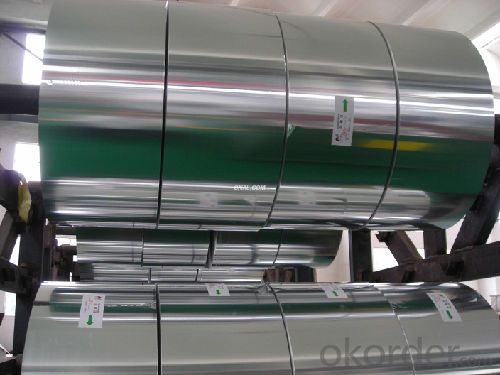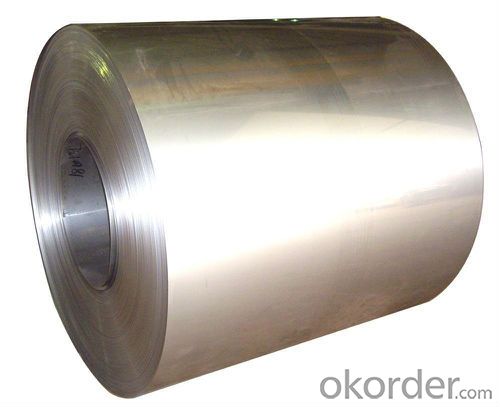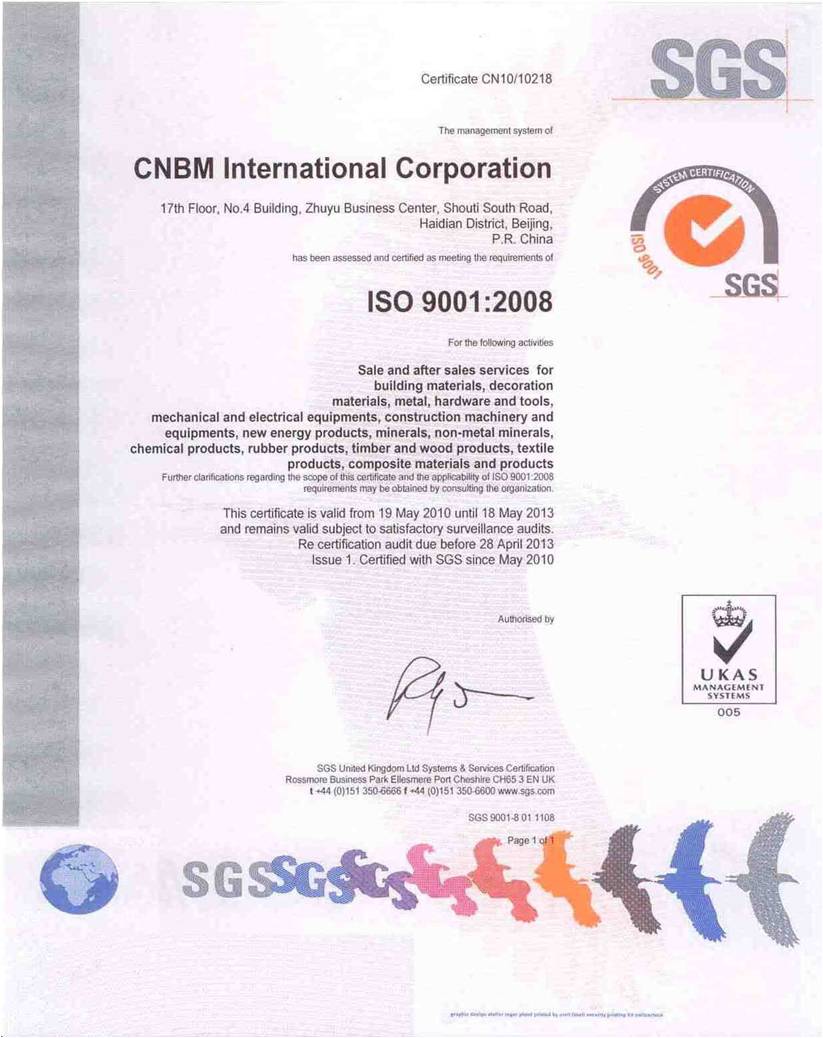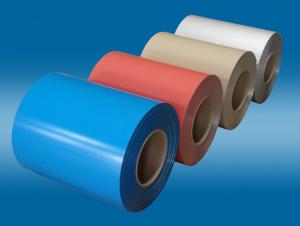Prepained Colorful Aluminum Coil and Sheets
- Loading Port:
- Shanghai
- Payment Terms:
- TT or LC
- Min Order Qty:
- 5 m.t.
- Supply Capability:
- 9000 m.t./month
OKorder Service Pledge
OKorder Financial Service
You Might Also Like
Aluminium is a relatively soft, durable, lightweight, ductile and malleablemetal with appearance ranging from silvery to dull gray, depending on the surface roughness. It is nonmagnetic and does not easily ignite. A fresh film of aluminium serves as a good reflector (approximately 92%) of visible light and an excellent reflector (as much as 98%) of medium and far infrared radiation. The yield strength of pure aluminium is 7–11 MPa, while aluminium alloys have yield strengths ranging from 200 MPa to 600 MPa. Aluminium has about one-third the density and stiffness of steel. It is easily machined, cast, drawn and extruded.
Alloy: AA1050, 1060, 1100, AA3003, 3005, 3015, 5052, 5754, 5083,8011,etc
Temper:H14/16/18/22/24/32,HO etc.
Thickness:0.2mm—100mm
Width:100mm—2300mm (Can be slitted)
Inner Diameter: 508MM
CoilWeight:500kg-3000kg(Max.)
Application: Foil stock, Circles, Roofing, Canstock, Marine plate,Anti-sliperypurpose in vehicles, packing and appliance.

Specifications
aluminium coil for transformer winding with round edges and paper interleaf. ALUMINIUM COIL FOR TRANSFORMER WINDING
ALLOY | TEMPER | SPECIFICATION (MM) | |||
THICKNESS | I.D | O.D | WIDTH | ||
1050, 1050A 1060,1070 1070A,1350 |
O | 0.08---0.20 | 150, 300, 400 | 700--- --980 | 16.0--- ---1500.0 |
>0.20--1.50 | 150,205,300,350,400,500 | ||||
>1.50--3.00 | 300, 400, 500, 600 | ||||

Chemical Composition and Mechanical Properties
CHEMICAL COMPOSITION (Max) | |||||||||
Si | Fe | Cu | Mn | Gallium | Cr | Boron | Zinc | Ti+Van | |
0.10 | 0.40 | 0.05 | 0.01 | 0.03 | 0.01 | 0.05 | 0.05 | 0.02 | |
| |||||||||
UTS (Mpa) | ELONGATION
| At temperature of 20 deg. c | |||||||
RESISTIVITY Ω·mm²/M, max | CONDUCTIVITY%IACS, min | ||||||||
59--135 | 20% Min | 0.028035 | 61.5 | ||||||
WE HEREBY VERIFIED THAT THE GOODS ARE PRODUCED BY CNBM, WHICH HAS PASSED THE CERTIFICATION OF QUALITY SYSTEM FOR ISO9001.

- Q:How are aluminum coils used in the automotive industry?
- Due to their numerous advantages over traditional materials, aluminum coils play a crucial role in the automotive industry. They are widely used in various parts and components of vehicles, enhancing performance, improving fuel efficiency, and reducing overall weight. A primary application of aluminum coils in the automotive industry is in the manufacturing of heat exchangers, such as radiators and condensers. Aluminum's excellent thermal conductivity enables efficient heat transfer, regulating engine temperature and optimizing performance. By incorporating aluminum coils in heat exchangers, vehicles can achieve better cooling efficiency, preventing engine overheating and maintaining optimal operating conditions. Furthermore, aluminum coils are utilized in the production of air conditioning systems, specifically in the condenser and evaporator units. These coils have excellent heat exchange capabilities, enabling efficient cooling or heating of the vehicle's interior. As a result, vehicles equipped with aluminum coil-based air conditioning systems can provide a comfortable environment for passengers while minimizing energy consumption. Moreover, aluminum coils are used in constructing lightweight body panels and structural components like doors, hoods, roofs, and chassis. Aluminum's high strength-to-weight ratio makes it ideal for reducing vehicle weight without compromising structural integrity. This weight reduction leads to improved fuel efficiency, reduced emissions, and enhanced performance in acceleration, handling, and braking. Additionally, aluminum coils find application in producing electrical systems in automobiles. Their excellent electrical conductivity makes them suitable for wiring harnesses, connectors, and other electrical components. The use of aluminum coils in these systems ensures efficient transmission of electrical signals and reduces overall vehicle weight, contributing to improved fuel economy. In conclusion, aluminum coils are extensively used in the automotive industry for various purposes, including heat exchangers, air conditioning systems, body panels, and electrical components. The exceptional properties of aluminum, such as thermal conductivity, strength-to-weight ratio, and electrical conductivity, enable automakers to produce lighter, more efficient, and environmentally friendly vehicles.
- Q:Can aluminum coils be used in pharmaceutical manufacturing?
- Pharmaceutical manufacturing can indeed utilize aluminum coils. In the pharmaceutical industry, aluminum is commonly employed for diverse tasks like packaging and manufacturing equipment. Aluminum coils are capable of producing containers, caps, and closures for pharmaceutical products. Particularly, these coils find extensive use in the manufacturing of blister packs, which are widely employed for packaging tablets and capsules. The preference for aluminum in pharmaceutical manufacturing is due to its exceptional barrier properties, resistance to corrosion, and capacity to safeguard the integrity of pharmaceutical products. Furthermore, aluminum possesses the advantages of being lightweight, recyclable, and having a low melting point, rendering it a versatile and cost-efficient option for pharmaceutical manufacturing.
- Q:Can aluminum coils be used for outdoor applications?
- Indeed, outdoor applications can utilize aluminum coils. Aluminum, as a material, possesses outstanding versatility and durability, enabling it to endure diverse weather conditions and temperatures. Its resistance to corrosion renders it suitable for outdoor environments that encounter moisture and humidity. Moreover, aluminum coils boast a lightweight characteristic, facilitating their transportation and installation within outdoor settings. Consequently, they find frequent usage in outdoor applications encompassing roofing, siding, gutters, and HVAC systems. Taken together, the strength, corrosion resistance, and longevity of aluminum coils establish them as a dependable option for outdoor applications.
- Q:Can aluminum coils be insulated?
- Indeed, insulation can be applied to aluminum coils. It is a widespread practice to enhance energy efficiency and avoid heat loss or gain. Usually, the insulation material envelops the aluminum coil, creating a safeguarding coating that minimizes thermal transfer. This insulation method contributes to preserving the desired temperature within the coil and averting detrimental condensation. Moreover, insulation additionally enhances the overall functionality and durability of the aluminum coil system.
- Q:What are the common sizes and dimensions of aluminum coils?
- The common sizes and dimensions of aluminum coils can vary based on the specific industry and application. However, there are some commonly used dimensions that are found across various industries. In the building and construction industry, aluminum coils are often available in widths ranging from 24 inches (609.6 mm) to 60 inches (1524 mm). The thickness of these coils can range from 0.019 inches (0.48 mm) to 0.032 inches (0.81 mm), although thicker gauges may also be available for specialized applications. For the transportation industry, especially in the manufacturing of automobiles and aircraft, aluminum coils are typically wider and thicker. Widths can range from 48 inches (1219.2 mm) to 72 inches (1828.8 mm), and thicknesses can vary from 0.035 inches (0.89 mm) to 0.125 inches (3.18 mm). In the food and beverage industry, where aluminum is commonly used for packaging purposes, the dimensions of aluminum coils can be smaller. Widths can range from 12 inches (304.8 mm) to 24 inches (609.6 mm), and thicknesses are usually around 0.006 inches (0.15 mm) to 0.020 inches (0.51 mm). It is important to note that these dimensions are not exhaustive and can vary depending on the manufacturer and specific requirements of the application. Therefore, it is always recommended to consult with suppliers or manufacturers to determine the most suitable sizes and dimensions for your specific needs.
- Q:Are aluminum coils prone to corrosion?
- Yes, aluminum coils are prone to corrosion. Aluminum is a reactive metal that tends to oxidize when exposed to oxygen and moisture, leading to the formation of a layer of corrosion on the surface of the coil. However, this can be mitigated by applying protective coatings or using alloys that are more resistant to corrosion.
- Q:What are the typical mechanical properties of aluminum coils?
- The mechanical properties of aluminum coils may differ depending on the specific alloy and temper of the material. However, aluminum coils typically possess the following mechanical properties: 1. Tensile strength: Aluminum coils generally demonstrate a high tensile strength, which refers to the maximum amount of tensile stress a material can endure before breaking. This property is crucial for applications that require the material to withstand heavy loads or stress. 2. Yield strength: Yield strength represents the stress threshold that a material can bear without undergoing permanent deformation. Aluminum coils typically possess a relatively high yield strength, enabling them to maintain their shape and structural integrity under normal operating conditions. 3. Elongation: Elongation refers to the extent to which a material can stretch or deform before fracturing. Aluminum coils usually exhibit a relatively high elongation, making them suitable for applications that involve forming or bending without breaking. 4. Hardness: The hardness of aluminum coils may vary depending on the alloy and temper. Aluminum alloys can undergo heat treatment to enhance their hardness, rendering them more suitable for applications that demand wear resistance or the ability to withstand harsh environments. 5. Fatigue strength: Fatigue strength denotes a material's capacity to resist the formation and growth of cracks under cyclic loading conditions. Aluminum coils generally exhibit good fatigue strength, making them suitable for applications subjected to repeated or fluctuating loads. It is important to note that these properties can vary depending on the specific alloy, temper, and processing conditions of the aluminum coils. Therefore, it is advisable to refer to the material specifications or contact the manufacturer for more precise and detailed information regarding the mechanical properties of specific aluminum coils.
- Q:Can aluminum coils be used in the production of electronic components?
- Indeed, electronic components can utilize aluminum coils in their production. Aluminum, a highly versatile and extensively employed metal across diverse industries, including electronics, harbors numerous benefits. Notably, it possesses a lightweight nature, exceptional thermal conductivity, resistance to corrosion, and superb electrical conductivity. These remarkable properties render aluminum coils fitting for deployment in electronic components, encompassing capacitors, transformers, inductors, and heat sinks. By incorporating aluminum coils in electronic components, the dissipation of heat becomes more efficient, performance is enhanced, and the overall weight of electronic devices is reduced.
- Q:How do aluminum coils compare to copper coils?
- Aluminum coils are generally lighter and less expensive than copper coils, but they have lower thermal conductivity and may require larger coil sizes. Copper coils, on the other hand, have superior heat transfer properties, making them more efficient for cooling or heating applications.
- Q:What are the standard tolerance levels for aluminum coils?
- Depending on the industry and application, the tolerance levels for aluminum coils can differ from the standard. Generally, these tolerance levels are established by industry standards and specifications like ASTM or ISO. For thickness, the tolerance levels for aluminum coils can range from +/- 0.002 inches to +/- 0.020 inches, depending on the aluminum's specific grade and thickness. Similarly, the tolerance levels for width can vary from +/- 0.010 inches to +/- 0.250 inches. Regarding flatness, the standard tolerance levels for aluminum coils specify the maximum deviation from a flat plane. This can range from 0.001 inches to 0.020 inches, depending on the application's specific requirements. Other factors that can affect tolerance levels include the aluminum coils' surface finish, edge condition, and mechanical properties. To determine the appropriate tolerance levels for aluminum coils, it is important to consult relevant industry standards, specifications, and the specific requirements of the application.
1. Manufacturer Overview |
|
|---|---|
| Location | |
| Year Established | |
| Annual Output Value | |
| Main Markets | |
| Company Certifications | |
2. Manufacturer Certificates |
|
|---|---|
| a) Certification Name | |
| Range | |
| Reference | |
| Validity Period | |
3. Manufacturer Capability |
|
|---|---|
| a)Trade Capacity | |
| Nearest Port | |
| Export Percentage | |
| No.of Employees in Trade Department | |
| Language Spoken: | |
| b)Factory Information | |
| Factory Size: | |
| No. of Production Lines | |
| Contract Manufacturing | |
| Product Price Range | |
Send your message to us
Prepained Colorful Aluminum Coil and Sheets
- Loading Port:
- Shanghai
- Payment Terms:
- TT or LC
- Min Order Qty:
- 5 m.t.
- Supply Capability:
- 9000 m.t./month
OKorder Service Pledge
OKorder Financial Service
Similar products
New products
Hot products
Related keywords





























